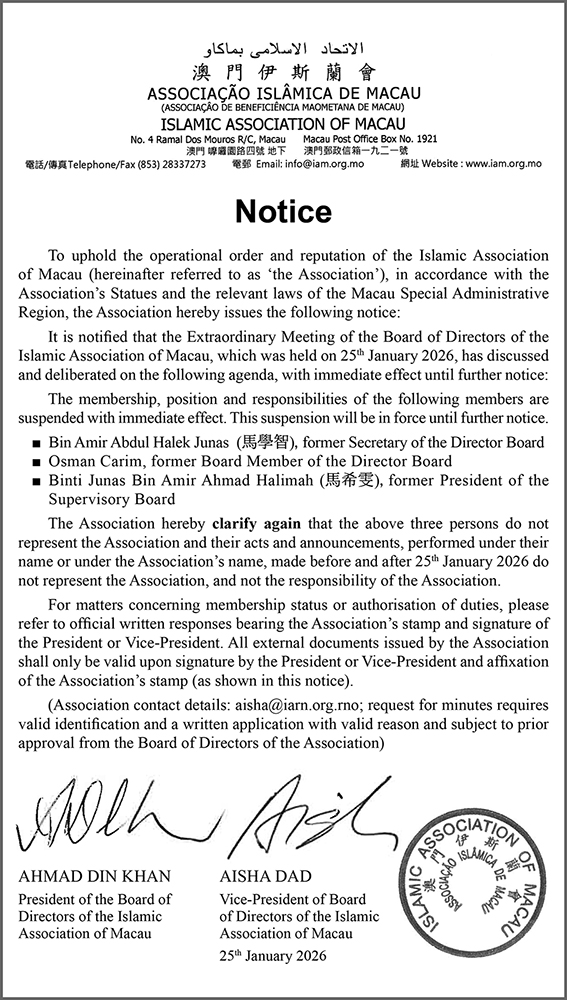Editorial
Communist Party of China (CPC) General Secretary Xi Jinping’s reaffirmed on Sunday in his speech at the Great Hall of the People in Beijing during the opening session of the Party’s 20th National Congress the complementarity between the nation’s overall jurisdiction over Macau and Macau’s high degree of autonomy.
“We will ensure both the central government’s overall jurisdiction and a high degree of autonomy in the special administrative regions” of Hong Kong and Macau, Xi said in his one-hour-45-minute key speech.
Xi also stressed that the One Country, Two Systems principle, “a great innovation of socialism with Chinese characteristics, has proven to be the best institutional arrangement for ensuring prosperity and stability in Hong Kong and Macau after their return to the motherland” on July 1, 1997 and December 20, 1999, respectively.
“This policy must be adhered to over the long term,” he emphasised, adding that the central authorities, i.e., the CPC and the Central People’s Government, “will fully, faithfully, and resolutely implement the policy of One Country, Two Systems, under which the people of Hong Kong administer Hong Kong and the people of Macau administer Macau, both with a high degree of autonomy.”
His remarks, such as “this policy must be adhered to over the long term,” came as a welcome confidence booster for the two SARs that share the same constitutional setup but politically, economically, societally and culturally are starkly different.
The high-degree-of-autonomy principle is expressly enshrined in the basic laws of Hong Kong and Macau: “The National People’s Congress authorises the Macau Special Administrative Region to exercise a high degree of autonomy…”.
Article 2 of both basic laws mentions the principle in exactly the same words, right after Article 1 which, also verbatim, states that both SARs are inalienable parts of the People’s Republic of China (PRC). The principle’s prominent positioning in the 145-Article Basic Law of the Macau SAR and 160-Article Basic Law of the Hong Kong SAR shows how important it is for both SARs.
While the high-degree-of-autonomy principle has been generally known in Hong Kong and Macau for over two decades, the legal concept of “overall jurisdiction” (全面管治權) entered the public sphere only less than a decade ago. Previously, it was mostly confined to the domains of political science and public law.
The State Council issued a white paper on the concept in June 10, 2014, which reminded people in Hong Kong that the central government holds the right to maintain overall jurisdiction over the HKSAR.
Detractors quickly claimed that “overall” meant “everything” and that the concept would turn One Country, Two Systems into “one country, one system.”
Veteran current affairs commentator Xiao Ping responded to the claim by insisting in a China Daily article published on December 21, 2017 that “falsely linking the exercise of sovereignty to blanket command over the administration misleads the HK public.”
Xiao Ping underlined that overall jurisdiction is a sovereign right. He reminded readers that China resumed the exercise of sovereignty over Hong Kong in 1997 which, obviously, did not amount to a “handover” of sovereignty.
The official Chinese term for the return of Hong Kong and Macau to the motherland is “hui gui” (回歸), which, directly translated, means “regression”, i.e., a return to a previous state. “Reversion” is another fitting translation, i.e., the action of returning to a former condition or practice. In the case of Hong Kong and Macau, both areas reverted to their original condition as Chinese-ruled regions.
There is a global consensus among historians nowadays that the “agreements” under the then feeble Qing court that which relinquished control over some of the nation’s areas in the 19th century to foreign powers are unequal treaties.
That’s why, according to Xiao Ping, what Britain got from the Qing Dynasty was jurisdiction but not sovereignty over Hong Kong, because of which Hong Kong was never a colony and, therefore, the Chinese government demanded that Hong Kong and Macau be removed from the UN’s list of colonies as soon the PRC regained its rightful seat in the global body in 1972.
Consequently, in 1997 China took back the overall jurisdiction over Hong Kong, and “what’s the point of taking Hong Kong back if we don’t have overall jurisdiction over it?”, Xiao Ping asked rhetorically.
I agree with the columnist that overall jurisdiction and a high degree of autonomy aren’t mutually exclusive. This means that the SAR governments of Hong Kong and Macau exercise their powers under the supervision of the central government.
Besides, other countries also have not just sovereignty but also overall jurisdiction over their autonomous regions such as Spain over its 17 autonomous communities and two autonomous cities (Ceuta and Melilla).
Xi also said in his speech, which was both programmatic and pragmatic, that the central government will support Hong Kong and Macau in growing their economies, improving their people’s lives, and resolving deep-seated issues and problems in socio-economic development, and promote long-term prosperity and stability.
Xi’s reference to “resolving deep-seated issues and problems” shows both his realistic approach towards, as well as his concern for, the two SARs. It can be assumed that, for instance, Macau’s gaming and junket operators do nowadays fully understand that their business practices cannot be allowed to hurt the country’s financial interests as this could even affect national security.
Understandably, Xi also said that the central authorities “will inspire more people in Hong Kong and Macau to love both the country and their own regions, be more patriotic, and forge a broader united front at home and abroad in support of the One Country, Two Systems policy”. Xi also had a stern warning to all those out to challenge the policy: “We will crack down hard on anti-China elements who attempt to create chaos in Hong Kong and Macau” and “take resolute action to prevent and stop interference in the affairs of Hong Kong and Macau by external forces.”
I am quite sure that the admonition is more directed at Hong Kong than Macau which, based on my four-decade-long personal experience here, has been one of the nation’s most patriotic places since time immemorial.
I have covered the working visits of three general secretaries of the CPC to Macau – Xi, Hu Jintao and Jiang Zemin, and my personal impression is that all of them showed a clearly discernible affection for our city – as did Premier Li Keqiang and his predecessor Wen Jiaobao when they toured Macau.
Well, the difference is Macau…
– Harald Brüning









